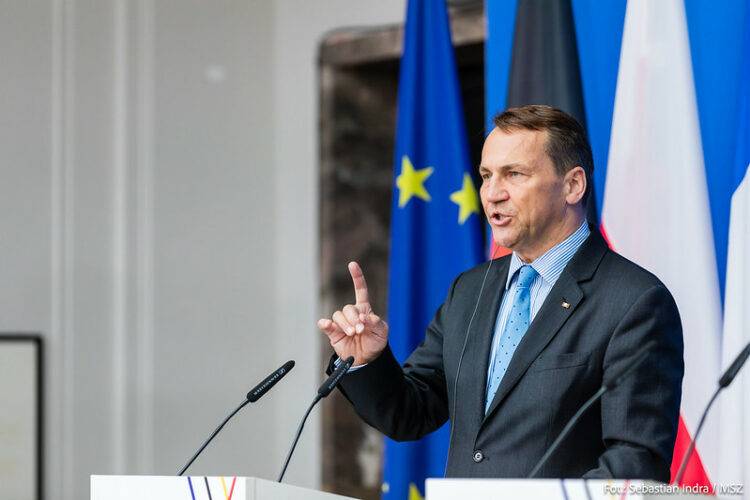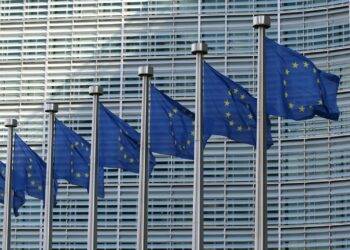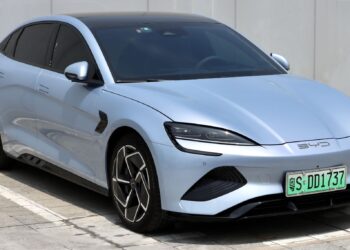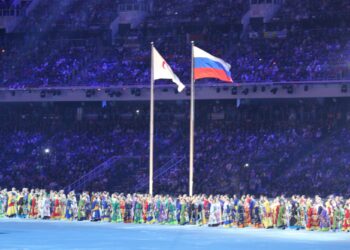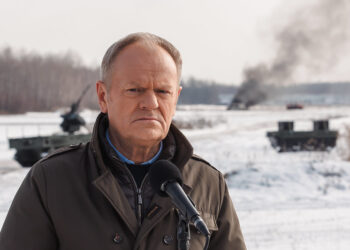Poland’s Foreign Minister, Radosław Sikorski, has called for a long-term rearmament of Europe, emphasizing the necessity for the UK to play a pivotal role in this strategy. Sikorski’s remarks were made during an exclusive interview with The Guardian, where he highlighted the urgent need to counter Russian imperial ambitions.
In the interview, Sikorski outlined several key proposals, including the introduction of majority voting for EU sanctions and the establishment of a 5,000-strong EU mechanized brigade. He also expressed Poland’s willingness to support an EU-wide initiative aimed at incentivizing Ukrainian draft dodgers to return to their homeland.
Sikorski’s stance on Ukraine’s right to strike military targets inside Russia marks a significant departure from the cautious approach of some Western allies. He argued that the West should stop imposing self-limitations on its support for Ukraine. This comes in contrast to the US position, with National Security Adviser Jake Sullivan opposing the use of US weapons on Russian territory.
He was sceptical about Russian threats to use nuclear weapons, saying: “The Americans have told the Russians that if you explode a nuke, even if it doesn’t kill anybody, we will hit all your targets [positions] in Ukraine with conventional weapons, we’ll destroy all of them.
Sikorski stated that Russia has been cautioned by both China and India against the use of nuclear weapons.
“And it’s no child’s play because if that taboo (of using nuclear weapons) were also to be breached, like the taboo of not changing borders by force, China knows that Japan and (South) Korea would go nuclear, and presumably they don’t want that.”
Educated at the University of Oxford alongside former British Prime Minister David Cameron, Sikorski has been instrumental in steering Poland back to the mainstream of European foreign policy. His tenure follows the October elections that saw the end of the right-wing nationalist Law and Justice party’s eight-year rule.
Sikorski’s recent engagements include a meeting in Berlin with the foreign ministers of France and Germany, part of the Weimar Triangle format. This grouping is now seen as a new political powerhouse within the EU. During these discussions, the Weimar group emphasized the need to address significant gaps in EU defense capabilities that have persisted since the end of the Cold War.
Poland is currently allocating 4% of its GDP to defense, a figure Sikorski highlighted as an example for other countries to follow. He pointed out that Europe has historically underinvested in defense, resulting in a lag in capabilities. “We are only now rediscovering that actually you just need millions of shells. You need large volumes of low-tech stuff as well,” he said, criticizing the post-Cold War focus on high-tech platforms and weapons.
““We have allowed all those production facilities to be closed down after the end of the cold war. It costs money to persuade companies to keep production lines in reserve. We just didn’t pay the money. “, he said.
Sikorski acknowledged that European defense manufacturers remain skeptical about the permanence of the rearmament process. He contrasted this with Russia’s approach, noting that President Vladimir Putin is spending 40% of GDP on defense, which he argued would ultimately bankrupt the country. Sikorski stressed the importance of long-term contracts for defense companies to secure investments and production.
On the subject of EU sanctions, Sikorski advocated for dropping the principle of unanimity, which has often led to delays. He also proposed making it an EU crime to breach sanctions, enforceable by the European prosecution service.
“We should drop the principle of unanimity in sanctions. Some of them have been delayed by one member state blocking them. And also it should be an EU crime to breach EU sanctions and therefore prosecutable by the European prosecution service.”, Sikorski added
Sikorski, a long-time observer of Russian tactics, warned against Putin’s efforts to woo the right in Europe and the US by exploiting traditionalism. He criticized Putin’s portrayal as a conservative leader, pointing out the contradiction of a former KGB colonel championing international conservatism.
“He is an absurd leader of the international conservatism. We are talking about a KGB colonel, for Christ’s sake. I think the Russians about 15 years ago did some polling, or maybe they just noticed that on some issues like attitudes to homosexuality, gender, to all kinds of identities, you can drive wedges in our societies. “, Sikorski told The Guardian.
Despite Brexit, Sikorski expressed support for the deepest possible inclusion of the UK in EU security and defense structures. He envisioned Britain as a permanent guest at the EU’s foreign affairs council and emphasized the importance of revitalizing EU-UK security cooperation through a structured framework.
Regarding Ukrainian draft dodgers, Sikorski called for clarity from Ukraine on its expectations. He dismissed the notion of a human right to social security for avoiding conscription and highlighted the need for a Europe-wide approach to prevent benefit shopping.
Sikorski also addressed the issue of Ukrainian strikes on Russian territory, noting the aggressive nature of Russia’s campaign against Ukraine’s civilian infrastructure. He criticized the West’s tendency to declare its own red lines, which he argued only invites Moscow to exploit these limitations.
Radosław Sikorski has been a prominent figure in Polish and European politics, known for his strong stance on defense and foreign policy. His recent efforts to re-align Poland with mainstream European policies come after a significant political shift in the country, moving away from the nationalist policies of the previous administration. Sikorski’s proposals and observations reflect his deep understanding of both historical and contemporary geopolitical dynamics, positioning Poland as a key player in the future of European defense strategy.

